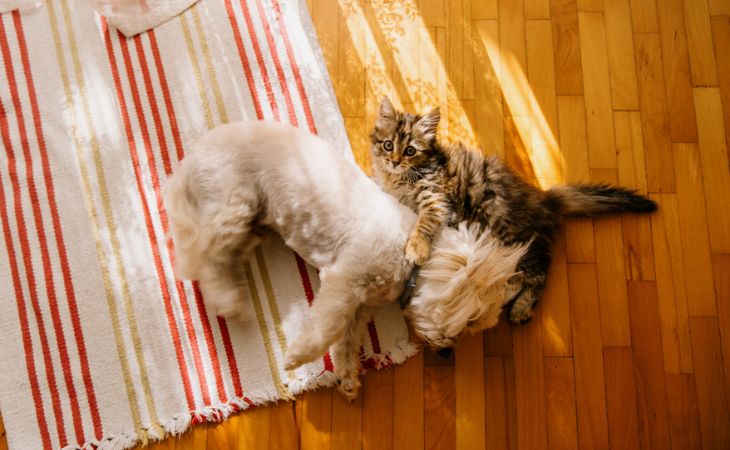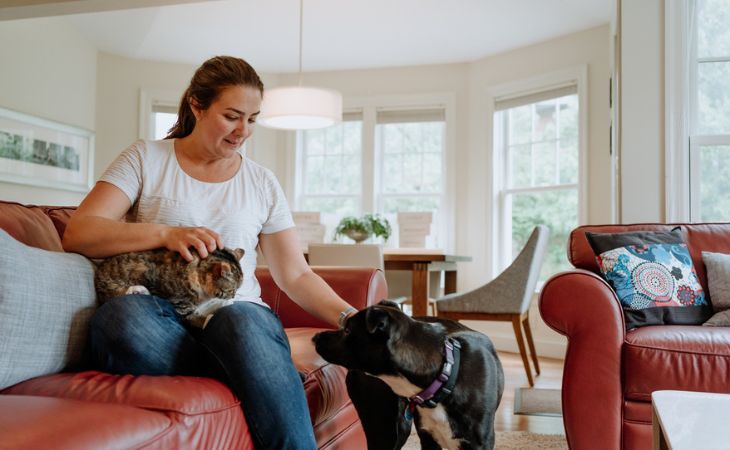Cats and dogs are popular pets. While some people prefer one over the other, this is not always the case. Some pet parents even have both of these pets. If you want to have a dog and cat as well, it’s important to take into account that cohabitation is not always easy. For example, your dog could be aggressive towards your cat. If this is the situation you’re in, Letsgetpet will tell you the causes of this behavior and help you overcome it.
What are the signs of a dog being aggressive towards a cat?
When it comes to cohabitation between a cat and a dog, you need to be careful to not confuse responsiveness and aggressiveness. These two different situations can express themselves through signs and common behavior. In case of responsiveness or aggressiveness towards your cat, your dog can have a focusing or fixation behavior. It’s even possible that they refuse to look at them. This can prevent your dog from relaxing or sleeping when your cat is around them. They can also start to yawn, squint, or lick their nose. The reactiveness or aggressiveness of your dog towards your cat can also be characterized by the following signs:
- jumping or pulling,
- chasing,
- refusing to eat,
- their hair standing upright.
To be sure that your dog is being aggressive towards your cat without confusing their behavior with reactiveness, you need to pay attention to other signs. Raising their lips is one of them. As soon as you notice this behavior when your dog is in the presence of your cat, you need to react immediately to avoid issues. Growling, body stiffening, leaping or snapping are signs of aggression to which you should pay close attention.
Outside of these things, it is possible that your dog attacks your cat by biting them to protect their food and toys. These different signs of aggressiveness are not the only ones, other ones exist. We recommend reacting as early as possible by asking for help from a professional as soon as you notice unusual behavior from your dog towards your cat.
Understanding why your dog is aggressive towards your cat
To help solve the issue efficiently, the first thing you need to do is try to understand the reasons behind this behavior. Before anything else, you need to know that these two animal species are not best friends in the nature. In the wild, cats are the prey of dogs. Therefore, they can’t necessarily live together. However, if they are domesticated, it is possible to get them to get along with each other and make it possible for them to live together.
That doesn’t mean problems can’t occur. Your dog can become aggressive towards your cat because of their hunting instincts. If their instincts dominate, they might start to try to hunt down your cat, which will trigger a feeling of fear in your cat. If this happens, your cat may run away to protect themself, or decide to attack in return. Dogs are also territorial animals, so they may become aggressive towards your cat if they see them on their territory.
Jealousy can also be the cause of your dog’s aggressiveness. They can start to aggress your cat if they notice that you give more attention to them and provide them with more toys. As these two animals are very possessive, you need to be sure that you can manage them before you adopt them together. Your dog’s aggressiveness towards your cat can also be because of behavior issues or physical health problems. It might be due to a lack of socialization linked to bad education or chronic pain. No matter the situation, it’s important to react quickly to solve your dog’s aggressiveness.
What are the solutions if my dog is aggressive towards my cat?
There are a number of ways to help your cat and dog get along.
Provide a personal space for each pet
To ensure that your two companions live together happily and safely, consider giving your cat a cat tree or allowing them to access a high shelf. It’s important that this space has an escape route to prevent your cat from feeling trapped. It’s especially recommended if your dog is aggressive towards them. They might always wait below them to attack.
When it comes to your dog, it’s recommended to give them a comfortable dog bed in a separated area, where the cats cannot access, to give them some privacy and peace. Make sure that their personal space is respected to maintain good cohabitation in your household.
Get your dog used to the presence of cats
To prevent conflict between your two companions, start your dog’s socialization from a very young age. A puppy is less likely to hurt a cat and they are naturally more receptive to new experiences during their first few weeks of life. This is particularly the case before the age of 16 weeks.
To get your dog used to the presence of cats, expose them often to cats and reward them systematically with a treat when they interact positively with them. This method allows your puppy to associate the presence of cats with a pleasant experience and rewards.

All them to meet outside of your house
When introducing a new pet to a household, it’s best to choose an outdoor location for the first meeting. This is particularly important if a dog or cat already resides in the house. These animals may not appreciate the intrusion of a new pet into their personal space.
This recommendation applies to all new presences. The presentation should always be done outside even if the animal is the same species or a newborn (puppy or kitten). To avoid territory conflicts, it’s best for the first interaction between your cat and your dog to be in a neutral space, far away from your house. This will allow them to meet harmoniously. Their cohabitation will also be more serene in the future.
Keep your dog busy
Your dog may be aggressive towards your cat if they have excess unspent energy. This energy needs to be channeled constructively to ensure good cohabitation between your two pets. This will also enable your dog to better control their impulses.
To do this, you can increase the frequency and intensity of their activities and exercise. Walking them more often can also be a way to channel this excess unspent energy. You can also use educational games because they mentally stimulate your dog, all while allowing them to tire themselves out physically.
Do not punish your dog
It’s recommended to avoid punishment during training sessions if your dog is aggressive towards your cat. It can cause them to feel less loved, which will only worsen the situation. Take into account that your dog’s aggressiveness may be caused by previous negative experiences such as an attack from a car. Therefore, by punishing them, they might start to associate punishment with the presence of a feline.
This can lead to a level of confusion during the training process and potentially increase the aggressiveness of your dog. They might even redirect this aggressiveness towards you. It’s best to call on a certified dog trainer who specializes in positive reinforcement and gentle methods. They will be able help you correct canine aggression, unlike punishment, which will only exacerbate the behavior.

